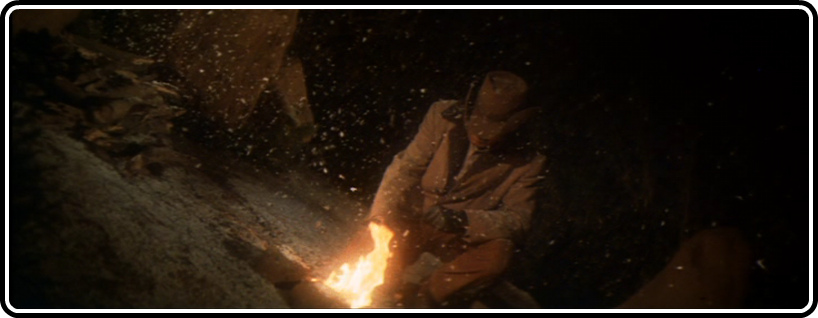It’ll be safer than getting married.
When I first heard about this film, it was when I was being sent a review disc from the Warner Archive. A Blake Edwards film that was a western? How hadn’t I ever heard of this film before. Known for his off the wall comedies, Wild Rovers is a peculiar departure in his filmography. Coming off of a $25 million dollar flop in 1970 called Darling Lili, Edwards’ next film was this one, which was supposed to originally me close to a three hour roadshow. Sadly for Edwards, MGM took control of the film in post production and cut it down to 106 minutes, which put a heavy burden on Edwards in general.
Luckily in 1986, the film was restored to a lengthier 136 minute running time, this time with the originally intended overture, intermission card and exit music. Thankfully for the restoration and Warner Archive for releasing this version, closest to Edwards original intention. But considering a western by a big name director starring the likes of William Holden, Ryan O’Neal and Karl Malden, it seemed a bit of a missed opportunity by Warner Bros. in general. But the true question is it any good?
Holden plays Ross Bodine, an aging cowboy who works for Walden’s Walt Buckman, riding cattle for him. Buckman oversees a large ranch with his two sons, John (Tom Skerrit) and Paul (Joe Don Baker). John is a bit on the untamed side, always trying to get his dad’s attention. Ross also has a young friend by the name Frank Post (Ryan O’Neal) who is a violent ranch hand, not being able to control his temper. Out of the blue, Ross and Frank decide to rob the local bank (this comes during a sub-plot that never goes anywhere concerning a feud between Buckman and his boys with a sheepman).
They kidnap the banker Billings (James Olson), threatening him to open the bank’s safe. He of course does so, and they get away with $36,000, a hefty amount in those days. But before going, they give Billings $3000 to cover the payment to the other cowboys at Buckman’s ranch. Unknown to Ross, Billings’ wife convinces him to pocket the money and pretend that Ross and Frank left with the full amount. This enrages Buckman, who then sends his two boys to get back the money by any means necessary.
As I said earlier, this was the last kind of film I expected from Blake Edwards and I’m thankful of the Warner Archive for dusting this off and giving people the chance to check out a lesser known western, one that came after The Wild Bunch (also with Holden) which also showcases the violence of people using slow motion to over accentuate the power of the act on screen. Edwards doesn’t hold back, showing us his West is as ugly as Peckinpah’s vision, but gives us these intimate moments involving humanity, even at times of crisis.
The core relationship in the film is of course between Holden’s Ross and O’Neal’s Frank. Two characters from the outside look and feel nothing alike; one an aging cowboy and the other a young and angry man, but in it Ross himself sees his youth and is nostalgic for it, which makes them two pieces to a puzzle that might not ever be completed. Their friendship is realistic, and we see an almost father/son dynamic going on, which is more than one can say for Buckman and his own son John, which is forever entangled in bitterness and never being quite good enough for his father.
A lot of people say the score by Jerry Goldsmith is a bit jarring, but I’m a big fan of it, seeing a lot of avant-garde cues, some of which are almost a wink to his sci-fi stuff (like Planet of the Apes), and if you can get the soundtrack, it’s one that is ripe for rediscovery. Holden is the all star in this film, just exuding the charisma he always had in films like The Wild Bunch and Network, and now that I’ve seen this film, I’m surprised this role isn’t mentioned more often when people speak highly of his acting prowess. O’Neal also is bright eyed and eager, hungry for these roles early in his career, which seems to always make me sad to see what he’s become in the last 20 years.
The Warner Archive Collection again comes up with a handful of gold with Wild Rovers. Their print is sharp and crisp, with little damage and it shines a light on the great restoration work that was done to the film back in the 80’s. It’s a film that you just can’t help but feel sympathetic for the main characters, wishing them the best even though they too have done a criminal act. But in today’s obsession of the anti-hero, what better time to showcase a film that has them in spades.
8.5/10




![Bergman Island (The Criterion Collection) [Blu-ray]](https://criterioncast.com/wp-content/uploads/2022/11/bergman-island-the-criterion-collection-blu-ray-400x496.jpg)
![This Is Not a Burial, It’s a Resurrection (The Criterion Collection) [Blu-ray]](https://criterioncast.com/wp-content/uploads/2022/11/this-is-not-a-burial-its-a-resurrection-the-criterion-collection-blu-ray-400x496.jpg)
![Lars von Trier's Europe Trilogy (The Criterion Collection) [The Element of Crime/Epidemic/Europa] [Blu-ray]](https://criterioncast.com/wp-content/uploads/2022/11/lars-von-triers-europe-trilogy-the-criterion-collection-the-element-of-400x496.jpg)
![Imitation of Life (The Criterion Collection) [Blu-ray]](https://criterioncast.com/wp-content/uploads/2022/11/imitation-of-life-the-criterion-collection-blu-ray-400x496.jpg)
![The Adventures of Baron Munchausen (The Criterion Collection) [4K UHD]](https://criterioncast.com/wp-content/uploads/2022/11/the-adventures-of-baron-munchausen-the-criterion-collection-4k-uhd-400x496.jpg)
![Cooley High [Criterion Collection] [Blu-ray] [1975]](https://criterioncast.com/wp-content/uploads/2022/11/cooley-high-criterion-collection-blu-ray-1975-400x496.jpg)